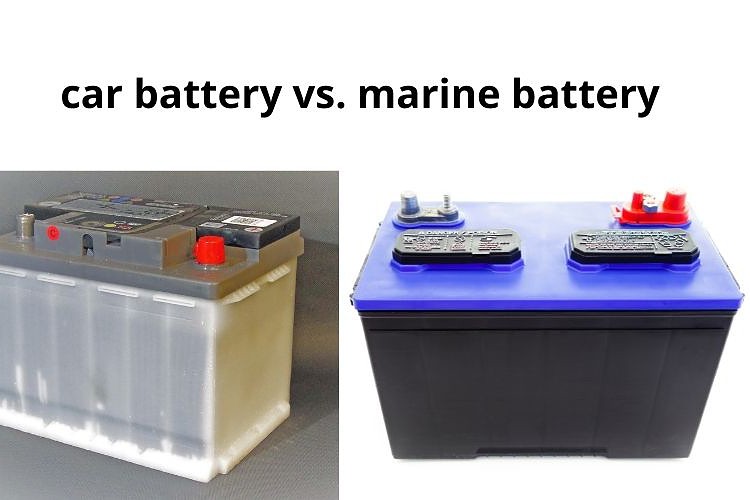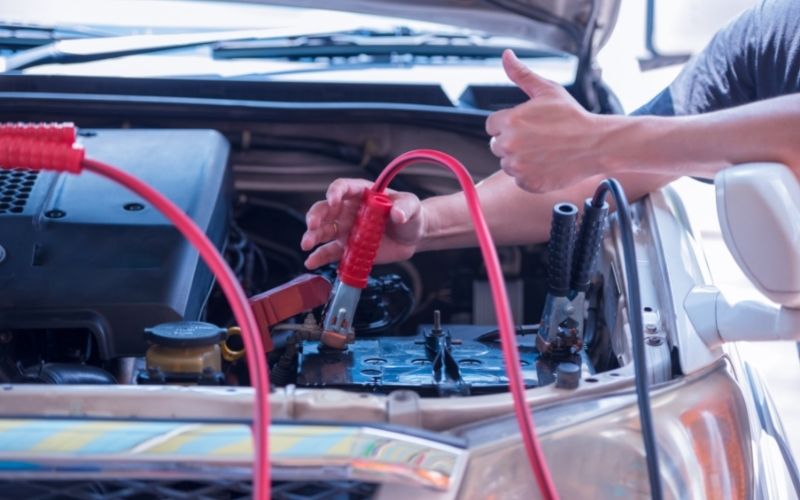You have had a wonderful day on the water, reeling in a tub full of fish. You load the tub in your car, take a seat behind the wheel, turn the key and then…nothing! Your car battery is dead, and you are stuck. But wait, you have an idea. Why not try to jump start your car battery with your marine battery? Is this possible?
Let’s investigate and find out, shall we?
Table of Contents
Can You Use A Deep Cycle Battery to Jump Start Your Car?

The temptation is extremely strong. Your car battery is dead and you need to get the car to start. You have a deep cycle battery handy, so you want to try a jump start.
It may work, depending on the juice that you have available and the size of the vehicle. Before attempting, make sure that the battery has at least 12 volts. If you have a smaller vehicle that requires low cranking amps the chances are good. But if you are attempting to jump start an SUV or truck, you may be disappointed. The more power your vehicle needs, the less likely the jump start will work.
If it does work, the question becomes: Is it a wise option? That may depend on the age of your vehicle. If your vehicle is an older model, you can count on little damage. Older vehicles usually have few electronic components.
But if your vehicle is a newer model, there are important factors to consider. Newer models most certainly include a computer system. You could damage that system by attempting a start with jumper leads or with insufficient power.
If your vehicle is less than five years old, it may have more than one computer that may be damaged. Entire wire harnesses have been fried. Luxury vehicles and foreign models have an even higher risk. Damages could cost you thousands of dollars.
You could also incur damage to your auxiliary electronics. If you are utilizing Bluetooth technology or a satellite navigation system, those could be damaged or destroyed. Even your air bag system is in jeopardy. So not only could you be costing yourself money, but you could be jeopardizing your, and your passengers’ safety.
Still, if those deterrents do not discourage you, or if starting your vehicle is critical, then it could work. If the deep cycle battery does jump start your car, it is best not to consider this as a long term solution. Continued use is not recommended. Minimally, you can expect the deep cycle battery life to be substantially shortened. So if you do jump start your car with one, get your car battery charged or replaced as soon as possible.
Are Marine and Car Batteries The Same?

So let’s take a close look at the differences between marine and car batteries. The difference between the two batteries begins with their different purposes. Car batteries simply give enough amps to start a gasoline or diesel engine. Regardless of the temperature outside, a large amount of amps must be supplied in a short time.
Once the car starts, the role of the car battery is complete. The car’s alternator is responsible for recharging the battery. Without the alternator, the car battery would soon go dead.
Marine batteries, however, have more tasks to complete. First, the marine battery must keep the boat’s lights going. The electrical components on the boat depend on the marine battery to continue. The power output must continue for a long time.
To do this, marine batteries have thicker internal lead plates. This allows a marine battery to last longer than a car battery. That is why you may have noticed that marine batteries are larger. You probably also realized that marine batteries have more protection around their housing. This is necessary because marine batteries typically are used in rougher conditions.
On the battery labels, you will also see the different amp measurements. While a car battery will have CCA, or cold cranking amps listed, a marine battery will have MCA, or marine cranking amps. Also, marine batteries are normally tested at freezing level, while car batteries are tested at temperatures below freezing. While you may drive in temperatures below freezing, you are not likely to be out in your boat when it is that cold.
Of course, this difference may change depending on what you are using your boat for. If you are on the water strictly for pleasure, the battery test temperature is not important. But if you are a commercial fisherman in Alaska, you will want to be sure your battery has been tested in the coldest temperature possible.
While it may seem that a car battery may be a wise choice to exchange with a marine battery in cold temperatures, this is not the case. For the safety reasons mentioned, you want to use a car battery in a car and a marine battery in a boat. Otherwise, there would be no need to make a distinction, and only one type of battery would be sold.
Conclusion

So we have compared car batteries with deep cycle batteries and marine batteries. We have seen that, technically, a deep cycle battery could be used to jump start a car, especially if the car is a small one. Similarly, we have seen that a car battery could be used in place of a marine battery.
But in both circumstances, it is not advisable to use one in place of the other. Car batteries, deep cycle batteries, and marine batteries are designed with different purposes in mind. Deep cycle batteries and marine batteries are not meant to supply the type of instant power surge that car batteries provide.
Also, car batteries are not designed to provide the ongoing power that is needed to keep a boat, and its electronic components, going for the time that is necessary for your excursion. The more electronic components your boat has, the more it depends on the endurance of a marine battery.
The most important factor is safety. You don’t want to be stranded, whether it is in your boat or your car. If all batteries were meant to be used in all situations, there would not be different battery types. In that case, all batteries would be designed and tested in the same way.
So use the correct battery for your purpose, and you will remain safe and enjoy your trip.

I created this site to help people – to help you – with your boat problems. Instead of helping one person at a time, I want this website to be the “one-stop-shop” for everyone’s boating concerns. Read more.

